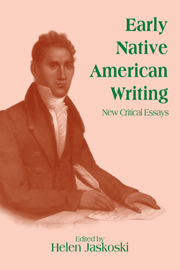Book contents
- Frontmatter
- Contents
- Foreword
- Preface
- List of Contributors
- 1 “Honoratissimi benefactores” Native American students and two seventeenth-century texts in the university tradition
- 2 “Pray Sir, consider a little”: Rituals of subordination and strategies of resistance in the letters of Hezekiah Calvin and David Fowler to Eleazar Wheelock
- 3 “(I speak like a fool but I am constrained)”: Samson Occom's Short Narrative and economies of the racial self
- 4 “Where, then, shall we place the hero of the wilderness?”: William Apess's Eulogy on King Philip and doctrines of racial destiny
- 5 “They ought to enjoy the home of their fathers”: The treaty of 1838, Seneca intellectuals, and literary genesis
- 6 “I am Joaquin!”: Space and freedom in Yellow Bird's The Life and Adventures of Joaquin Murieta, the Celebrated California Bandit
- 7 “This voluminous unwritten book of ours”: Early Native American writers and the oral tradition
- 8 “A terrible sickness among them”: Smallpox and stories of the frontier
- 9 “A desirable citizen, a practical business man”: G. W. Grayson – Creek mixed blood, nationalist, and autobiographer
- 10 “An Indian … An American”: Ethnicity, assimilation, and balance in Charles Eastman's From the Deep Woods to Civilization
- 11 “Overcoming all obstacles”: The assimilation debate in Native American women's journalism of the Dawes era
- 12 “My people … my kind”: Mourning Dove's Cogewea, The Half-Blood as a narrative of mixed descent
- 13 “Because I understand the storytelling art”: The evolution of D'Arcy McNickle's The Surrounded
Foreword
Published online by Cambridge University Press: 20 February 2010
- Frontmatter
- Contents
- Foreword
- Preface
- List of Contributors
- 1 “Honoratissimi benefactores” Native American students and two seventeenth-century texts in the university tradition
- 2 “Pray Sir, consider a little”: Rituals of subordination and strategies of resistance in the letters of Hezekiah Calvin and David Fowler to Eleazar Wheelock
- 3 “(I speak like a fool but I am constrained)”: Samson Occom's Short Narrative and economies of the racial self
- 4 “Where, then, shall we place the hero of the wilderness?”: William Apess's Eulogy on King Philip and doctrines of racial destiny
- 5 “They ought to enjoy the home of their fathers”: The treaty of 1838, Seneca intellectuals, and literary genesis
- 6 “I am Joaquin!”: Space and freedom in Yellow Bird's The Life and Adventures of Joaquin Murieta, the Celebrated California Bandit
- 7 “This voluminous unwritten book of ours”: Early Native American writers and the oral tradition
- 8 “A terrible sickness among them”: Smallpox and stories of the frontier
- 9 “A desirable citizen, a practical business man”: G. W. Grayson – Creek mixed blood, nationalist, and autobiographer
- 10 “An Indian … An American”: Ethnicity, assimilation, and balance in Charles Eastman's From the Deep Woods to Civilization
- 11 “Overcoming all obstacles”: The assimilation debate in Native American women's journalism of the Dawes era
- 12 “My people … my kind”: Mourning Dove's Cogewea, The Half-Blood as a narrative of mixed descent
- 13 “Because I understand the storytelling art”: The evolution of D'Arcy McNickle's The Surrounded
Summary
Early Native American Writing: New Critical Essays is the first volume devoted to this significant but neglected area of American Indian written literature. Whereas most scholarly books on Native American literature concentrate on traditional oral or contemporary written literature, Early Native American Writing breaks new ground by focusing on how Native American written literature evolved from its beginnings to become a highly imaginative, polished, and vibrant literature that has won its authors international acclaim.
Early Native American writers faced the dilemma of how to survive as Indians while coping with the dominant society's demand that they abandon their tribal cultures, world views, and oral traditions in order to assimilate to a Western European, Christian culture that revered written texts. George Copway (Ojibwe) dramatically describes this dilemma in Life, Letters and Speeches: “I loved the woods, and the chase. I had the nature for it, and gloried in nothing else. The mind for letters was in me, but was asleep, till the dawn of Christianity arose, and awoke the slumbers of the soul into energy and action” (11). Like the Native American authors discussed in this volume, Copway acted as a bridge between native people and the dominant society. To persuade his white audiences that native peoples were rational human beings, Copway emphasizes the innate ability of Indians to learn and to adapt. By appealing to his white readers as fellow Christians, he subtly underscores the equality of Indians with whites – an equality non-Indians too often ignored.
Copway's statement introduces a crucial issue that several scholars discuss in Early Native American Writing: How did individual authors adapt their sense of Indian self and their writing to the expectations of their white teachers and audiences?
- Type
- Chapter
- Information
- Early Native American WritingNew Critical Essays, pp. vii - xPublisher: Cambridge University PressPrint publication year: 1996

